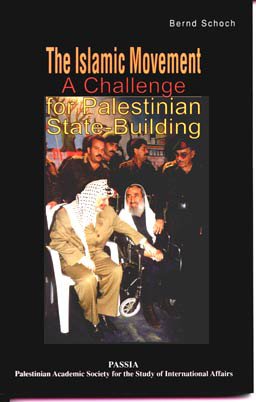Islamic Movement: A Challenge for Palestinian State-Building
This work examines the challenge that the Islamic movement, particularly Hamas, poses to the PLO and Palestinian state-building. Analyzing PLO-Hamas relations in the context of developing democracy and legitimacy, Schoch explores the two sides’ strategies and rivalries, particularly in local university elections. The author also assesses the impact of Hamas on regional stability and discusses how other states have dealt with religious fundamentalist movements.
Acknowledgments
Introduction
I. The Importance of Democratic Legitimization
1.1 The Strategy of Inquiry: Methodology
1.2 The Areas of Inquiry
1.3 International Implications
1.4 Strategies Deployed by the Actors for Articulating Their Grievances
1.5 The Actors
1.5.1 The Palestinian Liberation Organization (PLO)
1.5.2 Hamas - Islam as a Constitution
1.5.3 The Islamic Jihad and Minor Islamic Movements
1.6 A Peace Process Rejected by the Islamic Fundamentalists
1.7 Elections and Democratic Legitimacy
1.8 A Challenge to Arafat's Authority: Radical Islamic Fundamentalists
1.9 The Importance of the Democratic Transition of the PLO
II. Conflicting Model of Legitimacy
2.1 The Concept of Liberal Democracy
2.2 How to Measure Democracy?
2.3 Why Minorities Rebel in Palestine?
2.4 Two Concepts of Legitimacy Confront Each Other: Religious and Secular Theories
2.5 The Palestinian Authority and the Muslim Brotherhood
2.5.1 Electoral Legitimacy vs. Hamas Religious Legitimacy?
2.5.1.1 Professional Elections
2.5.1.2 Student Elections
2.5.2 Sharing Responsibility with Hamas to Improve Control of the Islamic Movement?
III. Autocratic Movements and Democracy: PLO and Hamas vs. Democratic Elections
3.1 The Importance of the Elections of 20 January 1996
3.2 The First Democratic Palestinian Elections
3.2.1 Free Elections
3.3 Election and Their Implications for Communal Conflicts
3.4 Power-Sharing Mechanisms between Institutional Actors
3.4.1 The Palestinian President vs. the Palestinian Council
3.5 The Institutional Opposition
3.6 Hamas and Islamic Jihad: The Opposition Outside the Institutions
3.6.1 Hamas - A Strategy of Confrontation and Cooperation
3.6.2 Cooperation between Hamas and PLO Until Victory
3.7 Islamic Disunity: Salvation for the Palestinian President?
3.8 The Civil Society in the Center of a Communal Mobilization
IV. Principles of Intra-Communal Conflict and the Potential for Regional Instability
4.1 The Transnational Challenge: Muslim Brotherhood without Borders
4.2 The Colonial Legacy
4.3 The Wye River Memorandum
4.3.1 An Alliance against Islamic Fundamentalism?

